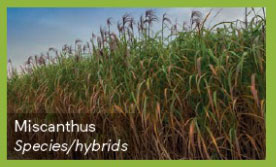Holder, A, Robson, P & McCalmont, J 2025, '
Effect of tillage method on early root growth of Miscanthus',
Annals of Applied Biology, vol. 187, no. 2, pp. 192-204.
10.1111/aab.70006 Donnison, I, Farrar, K, Kingston-Smith, A, Gallagher, J, Robson, P, Marley, C, Howarth, C, Lloyd, D, Fraser, M, Adams, J, Bryant, D, Yadav, R, Spittle, MJ, Thornton, J, Davies, S (ed.) & Cole, A (ed.) 2025,
Innovations for a Changing World: IBERS Impact Case Studies. Prifysgol Aberystwyth | Aberystwyth University.
10.20391/e88e4cc9-0080-4e08-959b-32a02ca2cd79 Hansen, A, Gladala-Kostarz, A, Hindhaugh, R, Doonan, JH & Bosch, M 2025, '
Mechanical stimulation in plants: Molecular insights, morphological adaptations, and agricultural applications in monocots',
BMC Biology, vol. 23, no. 1, 58.
10.1186/s12915-025-02157-3 Hodgson, EM, McCalmont, J, Rowe, R, Whitaker, J
, Holder, A, Clifton‐Brown, JC, Thornton, J, Hastings, A
, Robson, PRH, Webster, RJ, Farrar, K & Donnison, IS 2024, '
Upscaling miscanthus production in the United Kingdom: The benefits, challenges, and trade-offs',
GCB Bioenergy, vol. 16, no. 8, e13177.
10.1111/gcbb.13177 Ashman, C, Wilson, R, Mos, M, Clifton-Brown, J & Robson, P 2023, '
Improving field establishment and yield in seed propagated Miscanthus through manipulating plug size, sowing date and seedling age',
Frontiers in Plant Science, vol. 14, 1095838.
10.3389/fpls.2023.1095838 Clifton‐Brown, J, Hastings, A, von Cossel, M, Murphy-Bokern, D
, McCalmont, J, Whittaker, J, Alexopoulou, E, Amaducci, S, Andronic, L
, Ashman, C, Awty‐Carroll, D, Bhatia, R, Breuer, L, Cosentino, S, Cracroft‐Eley, W
, Donnison, I, Elbersen, B, Ferrarini, A, Ford, J, Greef, J, Ingram, J, Lewandowski, I, Magenau, E
, Mos, M, Petrick, M, Pogrzeba, M
, Robson, P, Rowe, RL, Sandu, A, Schwarz, K-U, Scordia, D, Scurlock, J, Shepherd, A
, Thornton, J, Trindade, LM, Vetter, S, Wagner, M
, Wu, PC, Yamada, T & Kiesel, A 2023, '
Perennial biomass cropping and use: Shaping the policy ecosystem in European countries',
GCB Bioenergy, vol. 15, no. 5, pp. 538-558.
10.1111/gcbb.13038 Briones, MJI
, Massey, A, Elias, DMO
, McCalmont, JP, Farrar, K, Donnison, I & McNamara, NP 2023, '
Species selection determines carbon allocation and turnover in Miscanthus crops: Implications for biomass production and C sequestration',
Science of the Total Environment, vol. 887, 164003.
10.1016/j.scitotenv.2023.164003Bhatia, R, Timms-Taravella, E, Roberts, LA, Moron-Garcia, OM, Hauck, B, Dalton, S, Gallagher, JA, Wagner, M
, Clifton-Brown, J & Bosch, M 2023, '
Transgenic ZmMYB167 Miscanthus sinensis with increased lignin to boost bioenergy generation for the bioeconomy',
Biotechnology for Biofuels and Bioproducts, vol. 16, no. 1, 29, pp. 29.
10.1186/s13068-023-02279-2 Iacono, R, Slavov, G, Davey, C, Clifton-Brown, J, Allison, G & Bosch, M 2023, '
Variability of cell wall recalcitrance and composition in genotypes of Miscanthus from different genetic groups and geographical origin',
Frontiers in Plant Science, vol. 14, 1155188.
10.3389/fpls.2023.1155188 Marques, MP, Martin, D
, Bosch, M, Martins, J, Biswal, A, Zuzarte, M, de Carvalho, LB, Canhoto, J & da Costa, R 2022, '
Unveiling the compositional remodelling of Arbutus unedo L. fruits during ripening',
Scientia Horticulturae, vol. 303, 111248.
10.1016/j.scienta.2022.111248da Costa, RMF
, Bosch, M, Simister, R, Gomez, LD, Canhoto, JM & de Carvalho, LB 2022, '
Valorisation Potential of Invasive Acacia dealbata, A. longifolia and A. melanoxylon from Land Clearings',
Molecules, vol. 27, no. 20, 7006 .
10.3390/molecules27207006da Costa, RMF
, Winters, A, Hauck, B, Martín, D
, Bosch, M, Simister, R, Gomez, LD, Batista de Carvalho, LAE & Canhoto, JM 2021, '
Biorefining Potential of Wild-Grown Arundo donax, Cortaderia selloana and Phragmites australis and the Feasibility of White-Rot Fungi-Mediated Pretreatments',
Frontiers in Plant Science, vol. 12, 679966.
10.3389/fpls.2021.679966 Miscanthus, a biomass crop to capture carbon emissions from the atmosphere and provide an alternative to fossil fuels, chemicals, and materials. Seven new varieties have been registered for intellectual property protection under the European system for plant breeders. New varieties developed at IBERS are marketed by our commercial partner Terravesta Ltd.
Miscanthus, a biomass crop to capture carbon emissions from the atmosphere and provide an alternative to fossil fuels, chemicals, and materials. Seven new varieties have been registered for intellectual property protection under the European system for plant breeders. New varieties developed at IBERS are marketed by our commercial partner Terravesta Ltd. Hemp is used to make a wide range of products from clothing to building materials, food, and medicines. IBERS researchers are investigating the potential for improving the fibre quality, oil and protein content of the seed, and boosting the health benefits by improving antioxidant and anti-inflammatory properties.
Hemp is used to make a wide range of products from clothing to building materials, food, and medicines. IBERS researchers are investigating the potential for improving the fibre quality, oil and protein content of the seed, and boosting the health benefits by improving antioxidant and anti-inflammatory properties. Macroalgae are marine crops used in numerous sectors including food, farm and pet feed, fertilisers, nutraceuticals, textiles, printing, and pharmaceuticals. IBERS researchers are working on biofertiliser properties of seaweeds, identifying applications for problematic macroalgae blooms, and working with commercial partners for pilot-scale processing trials and developing macroalgae-based plastic films to replace fossil-derived food packaging.
Macroalgae are marine crops used in numerous sectors including food, farm and pet feed, fertilisers, nutraceuticals, textiles, printing, and pharmaceuticals. IBERS researchers are working on biofertiliser properties of seaweeds, identifying applications for problematic macroalgae blooms, and working with commercial partners for pilot-scale processing trials and developing macroalgae-based plastic films to replace fossil-derived food packaging.
